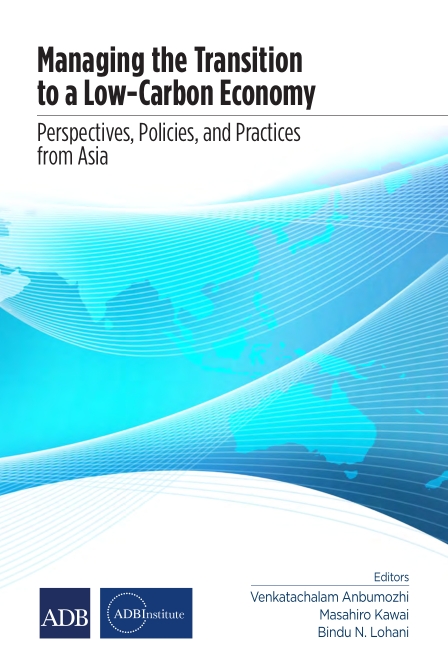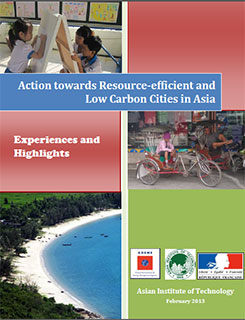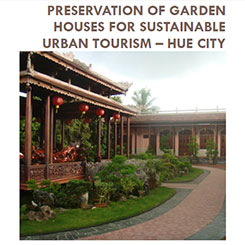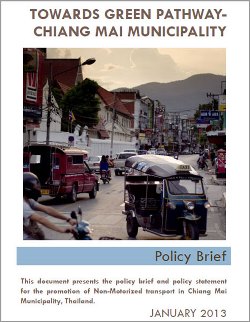by helpdesk | Apr 25, 2018 | Downloadables
ERIA – Springer Book Globalization of Low-Carbon Technologies The Impact of the Paris Agreement PUBLISHED BY ERIA – Springer About the Book This book explores the opportunities and barriers within the Intended Nationally Determined Contributions (INDC) framework of the Paris Agreement for low-carbon technology diffusion. Further, it proposes appropriate and feasible mechanisms required at local, national and regional levels to achieve the INDC targets. The book employs both meta policy analysis and scenario building to examine, whether the diffusion of low-carbon energy future by 2030 is economically viable under the INDC framework and how international technology cooperation could accelerate investments on the scale required for achieving the INDC targets. Further, this book provides new perspectives on market and non-market mechanisms for the globalization of low-carbon technologies, within the framework conditions of the Paris Agreement, which will be of significant value to senior policy makers, multi-disciplinary academia, and investing...

by helpdesk | Mar 21, 2016 | Downloadables
ADBI Booklet Managing the Transition to a Low-Carbon Economy Perspectives, Policies, and Practices from Asia PUBLISHED BY Asian Development Bank Institute (ADBInstitute) Kasumigaseki Building 8F, 3-2-5 Kasumigaseki, Chiyoda-ku Tokyo 100-6008 Japan Click image below to download in PDF format Introduction Technological measures, whether to promote low-carbon green growth or rapid industrialization, have unintended side-effects. These can be both negative (co-damages) and positive (co-benefits). In many analyses of the effects of current environmental policies, these side effects are often considered only partly or not at all. Furthermore, interactions among different technology measures can influence and be influenced by the environment and the socioeconomic system. Therefore, there is an urgent need for a methodological framework that considers all side effects to enable a better evaluation of technologies for all stakeholders at local, regional, and national levels. When implementing and creating initiatives that promote the development and use of low-carbon technologies, robust methods are needed to identify, categorize, and quantify their co-benefits and co-damages. Interest in co-benefits is increasingly becoming a crucial factor for enabling successful greenhouse gas (GHG) mitigation strategies that do not compromise national economic development plans (TERI 2010). However, policy makers need a way of quantifying the co-benefits from each low-carbon technology on a common platform so they can be evaluated against cost-efficient traditional technology projects. A methodology is provided here to evaluate the co-benefits of low-carbon technologies, paving the way for investments and policy developments in developing countries, and thus to create an economy that is resilient to climate change. Read...

by helpdesk | Aug 19, 2014 | Downloadables
ADEME Booklet Action Towards Resource-efficient and Low Carbon Cities in Asia Experiences and Highlights PUBLISHED BY Asian Institute of Technology (AIT) P. O. Box 4, Klong Luang Pathumthani 12120 Thailand Click image below to download in PDF format Summary With support from the French Environment and Energy Management Agency (ADEME) and SDCC/AIT- France Network, the Asian Institute of Technology (AIT) initiated “Action towards Resource-efficient and Low Carbon Cities in Asia” to promote low carbon society through improved resource efficiency and environmental sustainability in ten small and medium cities in Asia (Lao PDR, Sri Lanka, Thailand and Vietnam). The project aimed to strengthen capacity of city authorities, local institutions and other stakeholders of the cities in climate change mitigation and adaptation initiatives. The activities carried out in the project included training on Bilan Carbone© analysis and ‘Territorial Climate and Energy Plan’ approach, assessing greenhouse gas emissions at the city level, developing climate and energy plan, initiating pilot projects on mitigation and adaptation involving local stakeholders, and sharing experiences among participating cities. The major outcomes of these activities are discussed in this document. The project made an important contribution in sensitizing urban authorities (mayors, councilors, etc.) on the impacts of climate change, and on the need to take action at policy and implementation level for both mitigation and adaptation, following the principle of ‘think globally and act locally’. Read...

by helpdesk | Aug 19, 2014 | Downloadables
POLICY BRIEF This document presents the policy brief and policy statement for the promotion of garden houses in Hue city, Viet Nam JANUARY 2013 Click image below to download in PDF format About This Policy Brief Nestled between nature, garden houses can be a prime tourist attraction in the otherwise busy streets of Hue City. Garden houses combine nature, local cultural heritage and tourism making it a perfect combination to promote sustainable urban tourism. Moreover, it helps income generation for the owners and garden workers from the sale of fruits and vegetables from the gardens. Restricting motorized vehicles around the garden houses can provide additional income generating opportunities to the cyclo drivers and street vendors. This document presents the proposed policy brief and policy statement for Hue city, Vietnam for the promotion of garden houses for the sustainable urban green tourism. The proposed policy statement was approved by Mr. Ngo Hoa, Vice-Chairman of Thua Thien Hue Province People’s Committee for implementation. Contributors Asian Institute of Technology S. Kumar, K. Kusakabe, Pravakar Pradhan, Pujan Shrestha and Naga Srujana Goteti Hue Center for International Cooperation (HCIC) Nguyen Thi Khanh Linh and Le Phan Anh Thu Hue University of Sciences Tran Anh Tuan Other related policy briefs Towards green pathway-Chiang Mai Municipality Promotion of Non-Motorized transport in the Greater Mekong...

by helpdesk | Aug 19, 2014 | Downloadables
POLICY BRIEF This document presents the policy brief and policy statement for the promotion of Non-Motorized transport in Chiang Mai Municipality, Thailand. JANUARY 2013 Click image below to download in PDF format About This Policy Brief A Greenhouse Gas (GHG) inventory study conducted by Chiang Mai Municipality (CMM) on tourism related activities showed that the transportation sector contributes to significant emissions. Stakeholders of the tourism sector related activities then identified Non-Motorized Transport (NMT) in CMM as one option that can not only reduce emissions from transport, but also promote income generating opportunities for the poor. This booklet presents the policy brief and policy statement for the promotion of Non-Motorized transport in Chiang Mai Municipality, Thailand. The proposed policy brief and statement was approved by Lord Mayor Tassanai Buranupakorn of Chiang Mai Municipality, Thailand. Contributors Asian Institute of Technology S. Kumar, K. Kusakabe, Pravakar Pradhan, Pujan Shrestha and Naga Srujana Goteti Chiang Mai Municipality Trinnawat Suwanprik Other Related Policy Briefs Preservation of garden houses for sustainable urban tourism in Hue city, Viet Nam Promotion of Non-Motorized transport in the Greater Mekong...




